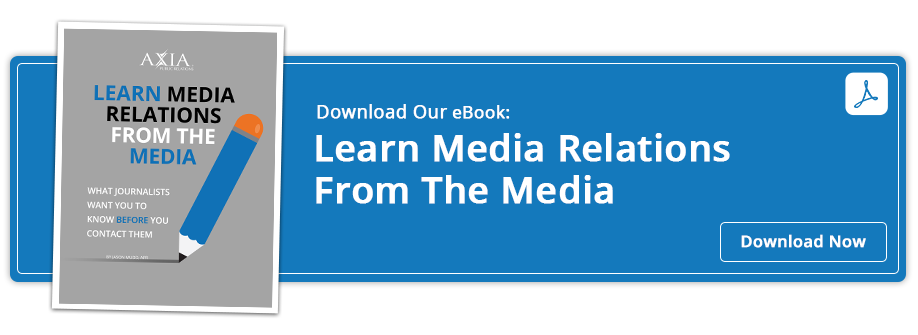
"What's newsworthy?" It mostly comes down to geography and subject matter.
Recently, someone asked me, “How would you define the word 'newsworthy?'” Great question; allow me to elucidate.
News elements
What makes a story newsworthy? Pay close attention to these 10 elements of newsworthiness to see which apply to your particular announcement. These elements are also called "news values" because they give a story news value. Good news stories have more than one of these elements to help increase earned media coverage.
- Proximity
Location, location, location: If an event is happening nearby, it will impact the audience more than if it were happening somewhere else that doesn't affect them as much, such as in another state or country. For example, if the local high school football team is going to the state championship, or if music star Taylor Swift is coming to town to perform, residents will want to know about it. Similarly, if your company is opening a location in a new state, your company becomes more relevant to people there.
- Prominence
A well-known person, place, or event has a stronger news angle than something the audience isn’t familiar with. A guest speaker visiting your local elementary school to take over story time doesn't resonate with many people... unless that speaker is Oprah, John Travolta, or Elon Musk.
- Timeliness
Current news has more impact than something that happened yesterday or last week. The public and news media lose interest quickly, and past events become stale when there's always fresh news somewhere. No one cares that a mild tropical storm passed last year, but if a major hurricane is en route… that’s a different story. In the same vein, journalists will likely glance over your company's product launch that happened six months ago, but your upcoming announcement is much more likely to grab their attention.
- Oddity
If something is unusual, shocking, or bizarre, the strangeness and novelty alone could make it newsworthy. A Florida man threw an alligator through a Wendy’s drive-thru window? You don’t hear that often. Has your company developed something new that no one else in the industry is doing? That's oddity!
- Consequence
If the impact of an event may directly affect readers, they'll want to know about it. A run-of-the-mill burglary at the Watergate Hotel was white noise on the airwaves until it became clear what the identities of the key players meant for the nation. An economic or natural disaster harming millions has serious consequences.
- Conflict
Audiences are always interested in disagreements, arguments, and rivalries. If an event creates conflict, many consumers will be interested based on that alone. Let's not forget that it's human nature to choose sides and stand up for their opinions, views, and preferences. Conflict news stories include religion, politics, legal disputes, sports, business, trials, wars, human rights violations, politics, and even struggles against nature, animals, and outer space.
- Human interest
If a situation draws an emotional reaction, it might contain the news element of a human-interest story. These can be "soft" stories like kid-at-the-petting-zoo snapshots, inspiring comeback stories that give an account of the impossible, or infuriating reports of incompetence on the part of a public figure. Your company's employees may fit the human interest angle of news if their story makes them unique.
- Extremes/superlatives
Reporters and audiences might be interested in the first, the best, the longest, the smallest, the highest – if you can legitimately claim one. Be careful. Do not overly focus on this, create hyperbole, or exaggerate claims. Dishonesty here will come back to bite you.
- Scandal
Reporters want a scoop on the scandal – everyone wants to hear all the details whenever there is moral or legal misconduct. The philandering congressman who sends inappropriate pictures under an absurd virtual handle is sure to draw media attention. This is one area of news you might not want your company to end in the spotlight.
- Impact
Whether it's a peaceful protest encompassing five city blocks or a 52-car pileup on the interstate, the more people involved in the event, the more newsworthy it is. Similarly, the number of people affected by the event will affect its newsworthiness, whether it's an adjustment of minimum wage, an alleged outbreak of Ebola, or a new technological advancement.
And remember: "Just the facts, ma’am."
-
Who?
-
What?
-
When?
-
Where?
-
Why?
-
How?
 Clients love Jason’s passion, candor, and commitment as well as the team he has formed at Axia Public Relations. He’s advised some of America’s most admired brands, including American Airlines, Dave & Buster’s, Hilton, HP, Pizza Hut, and Verizon. He is an Emmy Award-winning, accredited public relations practitioner, speaker, author, and entrepreneur with a certification in inbound marketing. He founded the PR firm in July 2002. Learn more about Jason.
Clients love Jason’s passion, candor, and commitment as well as the team he has formed at Axia Public Relations. He’s advised some of America’s most admired brands, including American Airlines, Dave & Buster’s, Hilton, HP, Pizza Hut, and Verizon. He is an Emmy Award-winning, accredited public relations practitioner, speaker, author, and entrepreneur with a certification in inbound marketing. He founded the PR firm in July 2002. Learn more about Jason.
Featured image credit: BigStockPhotos.com
Topics: media relations, public relations, earned media, news media



Comment on This Article